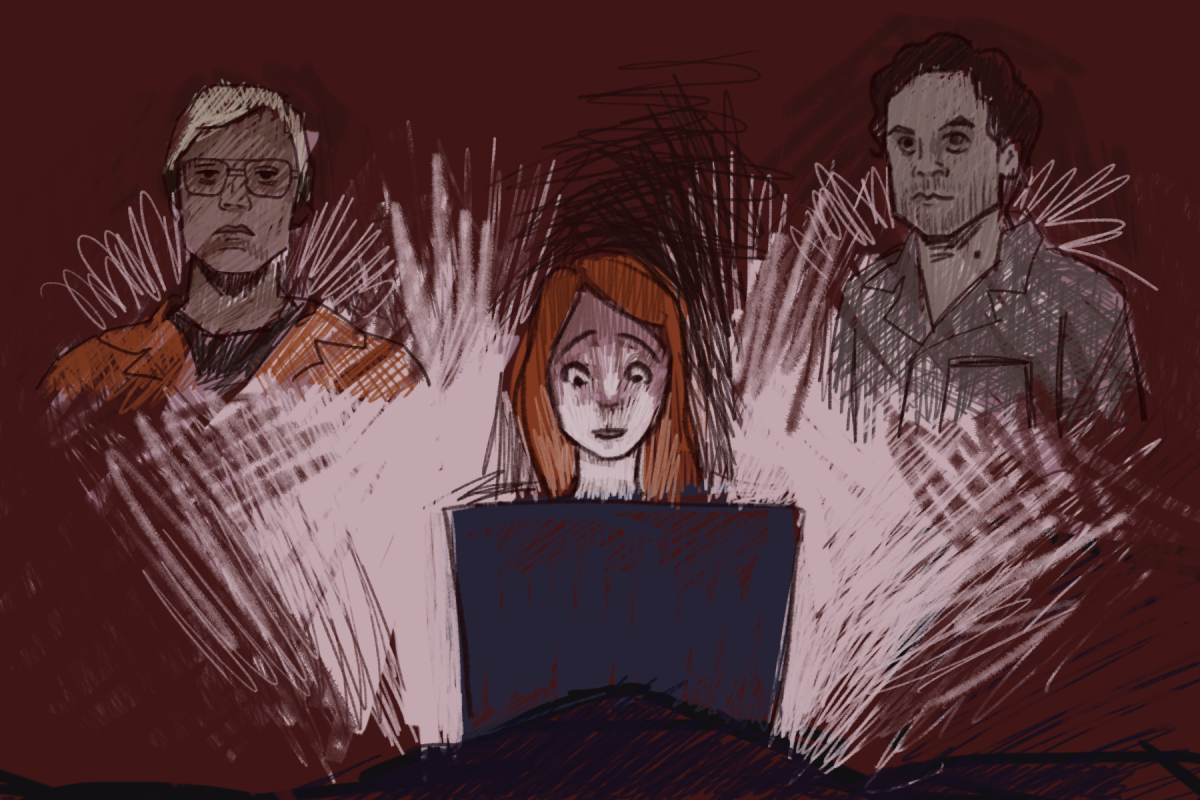True crime entertainment is more popular than ever, but at what point does our curiosity cross a line?
As Netflix’s “Monsters: The Lyle and Erik Menendez Story” reaches the Top 10 List, attracting over 19 million views worldwide, the impact of these dramatizations on public perception is evident and troubling. The series dives into the notorious case of the Menendez brothers, who murdered their parents in 1989 and have been in prison for 34 years. In conjunction with the show’s popularity, the brothers’ case had been moved towards resentencing, with their lawyer aiming for their release before Thanksgiving — an outcome that was unimaginable just months ago given the verdict that the brothers’ life-without-parole sentences.
Beyond being another true-crime hit, “Monsters” has reignited a troubling trend: the romanticization of criminals. The Menendez brothers now share this warped spotlight with other infamous criminals like Jeffrey Dahmer, whose image also experienced a renaissance following Ryan Murphy’s Netflix series about his infamous case. Social media is flooded with fan edits, thirst traps and even tributes to the brothers, blending admiration for the actors in the show with an unsettling fascination with the real-life killers. Fanmail has been sent to the Menendez brothers’ prison, complete with requests for autographs and words of support. Even Ariana Grande couldn’t escape the obsession, previously telling a young fan that Dahmer would be her dream date because she wanted to “ask him some questions.”
So what is exactly the problem with shows like “Monsters”? The allure of notorious figures is nothing new — but the current true-crime boom amplifies it in a dangerous way. Shows like “Monsters” feed into a toxic culture that blurs the boundary between learning about crime and developing unhealthy parasocial relationships with convicted killers.
This issue is especially relevant around Halloween, when some take their true-crime obsession too far, dressing up as real-life killers like Dahmer or the Menendez brothers. These costumes are more than just distasteful — they trivialize the trauma experienced by victims and their families and reduce horrific acts to mere pop-culture references. Nicholas Alexander Chavez, who portrays Lyle Menendez in the series, was pictured next to two fans dressed as the brothers, complete with blood-stained costumes reminiscent of the murder scene.
Whether it’s through adoration for a criminal’s ideology, such as what has occurred with the Unabomber or with the Killdozer case, the idolization of criminals by the general public creates an unacceptable culture that validates dangerous acts. Dahmer and the Menendez brothers represent types of dangerous personalities that have been reimagined into misunderstood victims of society and flawed anti-heroes in the public psyche. This unsettling infatuation has roots in psychological phenomena like hybristophilia, the sexual attraction to violent criminals. For some, the bad boy appeal, the desire to change someone for the better or even a thirst for fame fuels a fictional parasocial relationship. However, the consequences of these obsessions are anything but fictional, creating unsafe dynamics that excuse violent behavior.
Morbid curiosity is a term lightly thrown around for those who obsess over true crime and criminals. While the natural intrigue that surrounds these mysterious and grotesque atrocities is understandable, it becomes serious when fans start envying — and even craving — these horrific situations.
In cases where real crimes are adapted for entertainment, like in the case of Dahmer and the Menendez brothers, separating the actors from the role they are playing is crucial to lessening the obsession with criminals themselves. Of course, Evan Peters, Cooper Koch and Chavez played eerily accurate roles of the criminals they embodied, but we can’t fall into the true crime obsession loophole.
True crime can be informative and captivating, but to glorify its subjects is a step too far. It is important to consume these stories responsibly, without elevating perpetrators to celebrity status. Setting this boundary ensures our fascination with these stories doesn’t obscure the harsh truth: real lives were destroyed by their actions.
WSN’s Opinion section strives to publish ideas worth discussing. Opinions expressed in the house editorial reflect the views of WSN’s Editorial Board.
Contact Leila Olukoga at [email protected].























































































































































